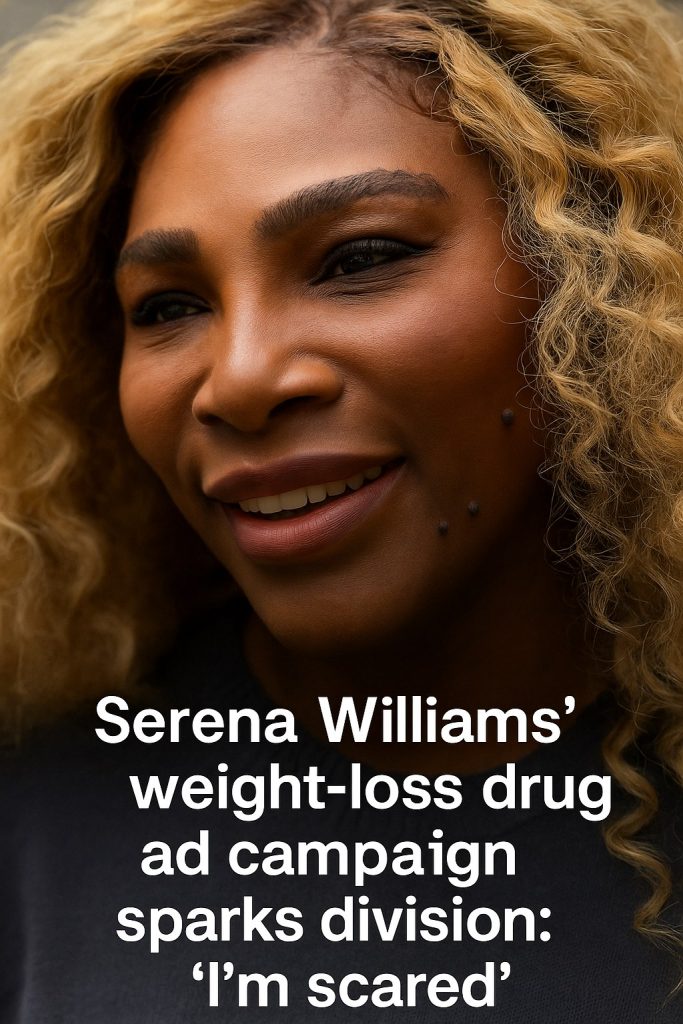Serena Williams, the iconic tennis champion renowned for her strength both on and off the court, has recently made waves by openly discussing her weight loss journey using GLP-1 medication. In a candid announcement that quickly captured attention across social media, Williams disclosed that she has lost an impressive 31 pounds with the aid of this drug, sparking a mix of admiration and controversy worldwide.
The medication, which belongs to a class called glucagon-like peptide-1 (GLP-1) receptor agonists, is primarily prescribed to manage type 2 diabetes but has found growing popularity as a weight loss treatment. It works by regulating appetite and blood sugar levels, helping individuals reduce calorie intake more effectively. Williams’ admission has thrust GLP-1 drugs into the spotlight beyond medical circles and into popular culture.
Williams first broke the news during a public event promoting health and wellness, accompanied by a striking campaign image that featured the global superstar alongside the statement: “Bulletin. Serena Williams’ weight-loss drug ad campaign sparks division: ‘I’m scared.’” The boldness of the advertisement and Williams’ willingness to discuss her personal health openly have ignited widespread discussion on social media platforms and beyond.
Supporters of Williams praise her transparency and courage, highlighting how her story may encourage others struggling with weight challenges to explore medically supported options without shame. “Seeing someone of Serena’s stature break the silence around weight loss medications helps destigmatize these treatments,” commented many fans and health advocates online. Given her influence, Williams’ endorsement has also bolstered public awareness of GLP-1 drugs as legitimate medical tools for weight management, not just fleeting diet fads.
However, the announcement has also been met with skepticism and concern by some observers. Critics worry that the glamorization of weight loss medications could create unrealistic expectations, particularly since GLP-1 treatments can have side effects and are intended to be part of comprehensive medical supervision rather than standalone solutions. Some voice fears that such campaigns might inadvertently promote dependency on pharmaceuticals or overshadow the importance of balanced lifestyle changes and physical activity.
Additionally, the message has unsettled certain audiences who feel that the advertisement’s tone—combined with Williams’ high-profile status—may unintentionally pressure individuals to seek pharmacological assistance when it may not be appropriate for their personal health. Comments expressing sentiments like “I’m scared” reflect the mixed feelings surrounding fast-emerging weight-loss drugs and the societal impact of their endorsements.
This conversation arrives at a time when GLP-1 medications are rapidly gaining traction globally, with many weight loss clinics reporting increased demand. Williams’ candidness places a human face on this medical trend, illustrating how even elite athletes can turn to these therapies when facing health and fitness hurdles after their intense competitive years.
As the dialogue unfolds, one thing remains clear: Serena Williams is using her platform to open important discussions about health, medicine, and body image. Her journey underscores the evolving ways in which people approach weight management in the 21st century, blending science, personal experience, and public discourse.
Meanwhile, medical professionals urge anyone considering GLP-1 treatments to consult healthcare providers thoroughly to understand the benefits, risks, and appropriate lifestyle supports. Serena Williams’ story resonates because it highlights that weight loss, regardless of method, is deeply personal and complex.
With debate growing louder by the day, Serena Williams’ announcement may well be a pivotal moment in how society views pharmaceutical interventions in the quest for health and wellness.


